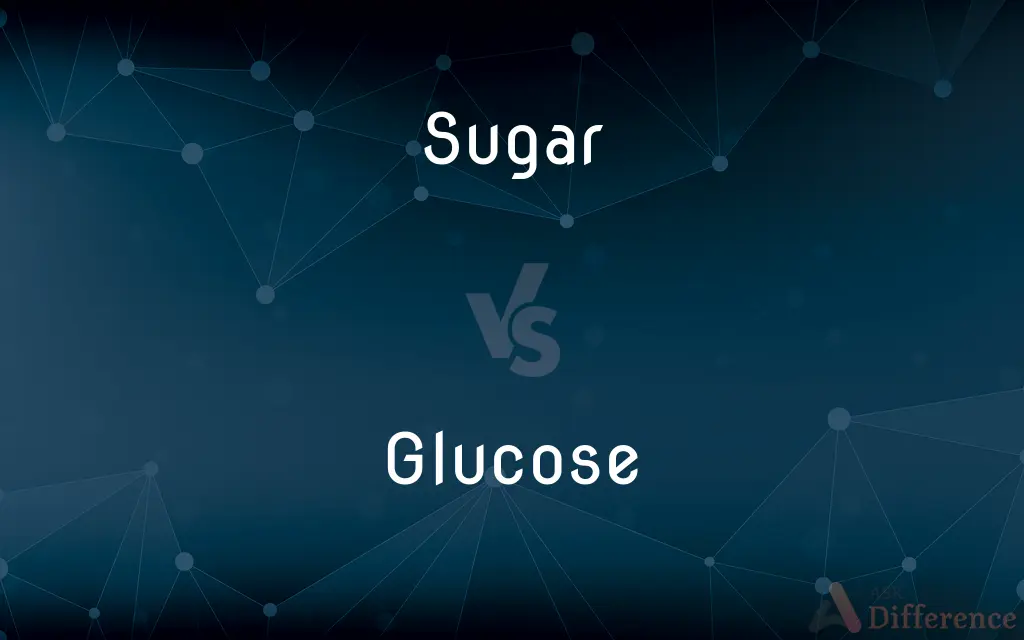Sugar vs. Glucose — What's the Difference?
By Urooj Arif & Fiza Rafique — Published on May 20, 2024
Sugar is a broad term for sweet-tasting, soluble carbohydrates, while glucose is a specific type of sugar that serves as a primary energy source for living organisms.

Difference Between Sugar and Glucose
Table of Contents
ADVERTISEMENT
Key Differences
Sugar encompasses a wide variety of carbohydrates found in foods, ranging from simple sugars like glucose and fructose to complex forms like sucrose and lactose. Glucose, on the other hand, is a simple sugar, also known as dextrose, that plays a crucial role in cellular respiration and energy production within the body.
Sugars are categorized into monosaccharides, disaccharides, and polysaccharides based on their molecular complexity. Glucose falls into the monosaccharide category, characterized by its single sugar molecule structure, whereas other sugars like sucrose (table sugar) are disaccharides, composed of two molecules.
In terms of sources, sugars are found in a vast array of foods, both natural and processed. Glucose is present in fruits and honey, often bonded with other sugars, and is a key product of photosynthesis in plants. It's also a critical blood sugar regulated by insulin in humans.
The impact on health varies between different types of sugars. Glucose is essential for providing energy to cells, but excessive intake can lead to health issues like diabetes and obesity. Other sugars, when consumed in high amounts, also contribute to these and other health concerns.
In culinary uses, sugars are employed for their sweetening properties, preservation, and fermentation. Glucose, specifically, is used in the food industry for its moderate sweetness and as a texture enhancer in candies and desserts.
ADVERTISEMENT
Comparison Chart
Type
Broad category of sweet-tasting carbohydrates
Specific type of simple sugar (monosaccharide)
Composition
Includes monosaccharides, disaccharides, polysaccharides
Single sugar molecule
Sources
Found in fruits, vegetables, grains, and added to processed foods
Present in fruits, honey, and as a product of photosynthesis
Role in Body
Source of energy, but excessive intake can lead to health issues
Primary energy source for cells, regulated by insulin
Health Impact
Excessive consumption linked to obesity, diabetes, and dental problems
Essential for energy, but high blood levels can be harmful
Culinary Uses
Sweetening, preservation, fermentation
Sweetening, texture enhancement in candies and desserts
Compare with Definitions
Sugar
A sweet crystalline substance obtained from various plants, especially sugar cane and sugar beet, used as a sweetener in food and drink.
She added a teaspoon of sugar to her coffee.
Glucose
A simple sugar that is an important energy source in living organisms and is a component of many carbohydrates.
Glucose levels in the blood are carefully regulated by insulin.
Sugar
General term for carbohydrates that taste sweet, including glucose, fructose, and sucrose.
The nutrition label showed that the cereal contained high levels of sugar.
Glucose
Found in the sap of plants, and the blood of animals, it is used in various sweetening and preservative food products.
The energy drink is fortified with glucose to provide quick energy.
Sugar
Used in the context of chemistry to refer to any of a large number of carbohydrates, including simple sugars and more complex forms.
The experiment involved analyzing different types of sugar for their chemical properties.
Glucose
Often used in sports and energy products to provide immediate energy due to its quick absorption and utilization by the body.
The marathon runners used glucose gels to maintain their energy levels during the race.
Sugar
Any of the class of soluble, crystalline, typically sweet-tasting carbohydrates found in living tissues.
Blood sugar levels are crucial for energy regulation in the body.
Glucose
Used in medical settings to treat high blood potassium levels, low blood sugar, and as part of oral glucose tolerance tests.
The patient was given a glucose solution to elevate his blood sugar levels.
Sugar
Informal term for sweet foods or confections.
After dinner, the kids were eager for some sugar.
Glucose
A key substrate in the cellular respiration process, breaking down to release energy.
Cells convert glucose into ATP through the process of cellular respiration.
Sugar
A sweet crystalline or powdered substance, white when pure, consisting of sucrose obtained mainly from sugarcane and sugar beets and used in many foods, drinks, and medicines to improve their taste. Also called table sugar.
Glucose
A monosaccharide sugar, C6H12O6, that is used by living things to obtain energy through the process of aerobic respiration within cells. It is the principal circulating sugar in the blood of humans and other mammals.
Sugar
Any of a class of water-soluble crystalline carbohydrates, including sucrose and lactose, having a characteristically sweet taste and classified as monosaccharides, disaccharides, and trisaccharides.
Glucose
A colorless to yellowish syrupy mixture of dextrose, maltose, and dextrins containing about 20 percent water, used in confectionery, alcoholic fermentation, tanning, and treating tobacco. Also called starch syrup.
Sugar
(countable) A small serving of this substance (typically about one teaspoon), used to sweeten a drink.
He usually has his coffee white with one sugar.
Glucose
(carbohydrate) A simple monosaccharide (sugar) with a molecular formula of C6H12O6; it is a principle source of energy for cellular metabolism.
Sugar
In making maple sugar, to complete the process of boiling down the syrup till it is thick enough to crystallize; to approach or reach the state of granulation; with the preposition off.
Glucose
A variety of sugar occurring in nature very abundantly, as in ripe grapes, and in honey, and produced in great quantities from starch, etc., by the action of heat and acids. It is only about half as sweet as cane sugar. Called also dextrose, grape sugar, diabetic sugar, and starch sugar. See Dextrose.
Sugar
A sweet white (or brownish yellow) crystalline substance, of a sandy or granular consistency, obtained by crystallizing the evaporated juice of certain plants, as the sugar cane, sorghum, beet root, sugar maple, etc. It is used for seasoning and preserving many kinds of food and drink. Ordinary sugar is essentially sucrose. See the Note below.
Glucose
Any one of a large class of sugars, isometric with glucose proper, and including levulose, galactose, etc.
Sugar
In making maple sugar, to complete the process of boiling down the sirup till it is thick enough to crystallize; to approach or reach the state of granulation; - with the preposition off.
Glucose
A monosaccharide sugar that has several forms; an important source of physiological energy
Sugar
An essential structural component of living cells and source of energy for animals; includes simple sugars with small molecules as well as macromolecular substances; are classified according to the number of monosaccharide groups they contain
Common Curiosities
Can the body use other forms of sugar besides glucose for energy?
Yes, the body can convert other sugars and carbohydrates into glucose or use them directly for energy, but glucose is the most readily used form.
How do plants produce glucose?
Plants produce glucose through photosynthesis, using sunlight to convert carbon dioxide from the air and water from the soil into glucose and oxygen.
Are sugars found in fruits healthier than processed sugars?
Sugars in fruits are considered healthier due to the presence of fiber, vitamins, and minerals, which modulate blood sugar levels and provide health benefits, unlike processed sugars.
How does the body respond to high sugar intake?
High sugar intake can lead to a spike in blood glucose levels, prompting insulin release to help cells absorb glucose. Over time, excessive sugar can lead to insulin resistance, obesity, and diabetes.
How do artificial sweeteners compare to glucose?
Artificial sweeteners can mimic the sweetness of glucose without the calories, but they don't provide energy and can have varied effects on metabolism and cravings.
Is all sugar bad for you?
Not all sugar is harmful in moderation, especially sugars found naturally in fruits and vegetables, which come with essential nutrients and fiber. Problems arise with excessive consumption, particularly of added sugars.
Can glucose be made from non-carbohydrate sources?
Yes, through a process called gluconeogenesis, the body can produce glucose from non-carbohydrate sources like proteins and fats.
Is glucose vegan?
Glucose itself is vegan, as it's a simple sugar found in plants. However, the source of commercial glucose products should be checked for non-vegan processing agents.
Why is glucose important for diabetics to monitor?
Diabetics must monitor glucose because their bodies struggle to regulate blood sugar levels, leading to health complications if levels become too high or too low.
Can you be allergic to glucose?
Allergies to glucose are extremely rare since glucose is a fundamental molecule in human metabolism. Issues usually arise from other components in glucose-containing products.
Do all cells use glucose?
Most cells can use glucose for energy, but certain cells, like brain cells, rely heavily on glucose as their primary energy source.
Can excessive fruit consumption lead to too much glucose intake?
While fruits contain glucose, they also have fiber and nutrients that mitigate blood sugar spikes. Excessive consumption can be an issue, but it's less concerning than processed sugars.
How do athletes use glucose?
Athletes use glucose for quick energy replenishment, especially in endurance sports, to maintain optimal performance levels.
What's the difference between blood sugar and glucose?
"Blood sugar" and "glucose" are often used interchangeably, referring to the glucose concentration in the blood, an important energy source for the body's cells.
How is glucose stored in the body?
Glucose is stored as glycogen in the liver and muscles for future energy needs, and it can be converted back to glucose when required.
Share Your Discovery

Previous Comparison
Zinc Picolinate vs. Zinc Chelate
Next Comparison
Camp vs. BivouacAuthor Spotlight
Written by
Urooj ArifUrooj is a skilled content writer at Ask Difference, known for her exceptional ability to simplify complex topics into engaging and informative content. With a passion for research and a flair for clear, concise writing, she consistently delivers articles that resonate with our diverse audience.
Co-written by
Fiza RafiqueFiza Rafique is a skilled content writer at AskDifference.com, where she meticulously refines and enhances written pieces. Drawing from her vast editorial expertise, Fiza ensures clarity, accuracy, and precision in every article. Passionate about language, she continually seeks to elevate the quality of content for readers worldwide.















































